Speak 2 Impress
No products in the cart.


25 Engaging Narrative Speech Examples for Effective Storytelling
Are you finding it tough to keep your audience hooked on your stories? Trust me, you’re in good company; I’ve wrestled with the same challenge and knew something had to give. After diving deep into research, I stumbled upon 25 captivating narrative speech examples that completely revolutionized my approach to storytelling .
In this article, I’ll share these dynamic techniques and real-life instances that will empower you to enchant any crowd. Brace yourself for a true game-changer !
Table of Contents
Key Takeaways
- Narrative speeches are a powerful way to share stories and ideas. They use personal experiences or creative tales to make messages memorable.
- Effective narrative speeches require careful planning, from choosing the right topic to organizing thoughts in an engaging way.
- Using descriptive language, vivid details, and expressive tone can help bring your story to life for listeners.
- There are many topics you can explore in a narrative speech, including personal challenges, memorable experiences, and lessons learned.
- Practice and feedback are important steps in improving your storytelling skills for captivating audience attention .
Understanding the Essence of Narrative Speeches
What is a narrative speech and how it differs from anecdotes.
Definition of the word ‘narrative’
A narrative is a story that someone tells or writes . This story can be about real events from the past or made-up adventures . In speeches, narratives help us share personal experiences and entertain our audience.
They bring life to our words by allowing listeners to see through our eyes. Stories in narrative speeches often highlight lessons learned or moments that changed us.
Using effective storytelling techniques , these stories connect with people on a deeper level . Every good speech uses elements of narratives to keep the audience engaged and interested.
We use tales from our own lives or others’ experiences as examples when talking about overcoming fear, learning new skills, or any topic we choose for public speaking .
Difference between anecdotes and stories
Anecdotes are brief personal stories , while stories are more detailed and often fictional or based on real events. Anecdotes aim to illustrate a specific point or experience , whereas stories have a developed plot with characters and settings .
Anecdotes usually focus on one incident, while stories can span a longer period and involve multiple events. Additionally, anecdotes tend to be shorter in length than stories.
The distinction between anecdotes and stories lies in their depth and purpose; anecdotes serve as brief illustrations for specific points or experiences, while stories offer more extensive plots with characters and settings, typically involving multiple events over a longer timespan.
Effective Narrative Speech Topics
Choosing captivating narrative speech topics is crucial for engaging your audience and making an impact. From brainstorming ideas to selecting the right topic, this section will guide you through the process, ensuring your narrative speech resonates with your listeners.
Brainstorming ideas
When brainstorming ideas for narrative speeches, consider real-life experiences and personal anecdotes . Here are some engaging topics to spark your creativity:
- Reflect on a valuable lesson learned
- Describe a memorable travel experience
- Share a moment of overcoming fear or adversity
- Discuss a significant achievement or milestone
- Explore a unique hobby or passion
- Recall a funny or embarrassing moment
- Delve into a cultural tradition or family heritage
- Analyze a turning point in your life
- Examine the impact of a role model or mentor
- Reflect on a memorable childhood experience
Remember , your own experiences can be the most compelling source of storytelling material!
Choosing the right topic
When choosing a topic, consider real-world experiences and anecdotes . Your story should be engaging and relatable to your audience. Think about personal challenges , unexpected adventures , or lessons learned .
These topics will make your narrative speech more impactful and memorable for your listeners, enhancing the effectiveness of your storytelling skills.
So, here are 40 firsts you can consider for your narrative speech topics :
- Your first day at school
- Your first pet
- Your first time riding a bike
- The first movie you ever watched at the cinema
- Your first camping trip
- The first time you traveled by plane
- Your first job interview experience
- Your first public speaking experience in school
- The first time you cooked a meal by yourself
- Your first volunteering experience
- The first time you overcame a fear or phobia
- The moment of your highest achievement so far
- The moment of your lowest point in life
- That one person who has had the most significant impact on your life
- A great lesson learned from a failure
- Your biggest adventure yet
- The funniest mistake you’ve ever made
- A surprising discovery that changed your perspective on something important
- A moment when someone’s small act of kindness meant the world to you
- An unforgettable family tradition or ritual
- Your most memorable travel experience
- A mystery or ghost story that still gives you chills
- Meeting someone famous unexpectedly
- An embarrassing moment that turned into a valuable life lesson
- The day that completely changed the course of your life
- The greatest risk you took and what happened next
- A challenge that tested your patience and resilience
- How a seemingly ordinary event led to extraordinary opportunities for growth and success
- The best surprise party or celebration planned for someone else
- An unexpected turn of events leading to an unusual friendship
- Losing something precious and learning to cope with it
- Experiencing an extreme weather condition like never before
- Rescuing an animal in need or being rescued by one
- That one subject in school which impacted your way of thinking
- Owning up to a mistake and dealing with its consequences
- A personal project or hobby turning into something much more than anticipated
- Discovering an old family secret or hidden treasure
- Attending an event that broadened your cultural horizons dramatically
- An encounter with nature that left an indelible mark on your soul
- The day when empathy made all the difference, bringing about positive change.
As we have explored various engaging narrative speech examples, let’s now understand how to write a compelling narrative speech .
40 tell-a-story speech topics
- Overcoming a fear
- A memorable family vacation
- Learning to ride a bike
- Meeting a childhood hero
- Getting lost in an unfamiliar place
- Standing up for what’s right
- My first job interview
- Making a big decision
- The best gift I ever received
- A challenging sports moment
- A funny misunderstanding
- My proudest achievement
- Dealing with failure and learning from it
- An unexpected act of kindness
- The power of teamwork in a tough situation
- Making a new friend in an unlikely place
- .The day that changed my life
- .An unforgettable journey
- .Coping with a difficult loss
- .Discovering a passion or hobby
- .A valuable lesson learned from a mistake
- .Facing a personal challenge head – on
- .Exploring a new culture or tradition
- Experiencing the joy of accomplishment after hard work
- Exploring the beauty of nature
- Facing and overcoming adversity
- Discovering the true meaning of friendship
- Learning to appreciate the little things in life
- Navigating through peer pressure successfully
- Stepping out of my comfort zone for growth
- Making a tough moral decision
- Finding inspiration from an unexpected source
35 more narrative or personal story speech topics
Transitioning from brainstorming ideas to choosing the right topic, here are 35 more narrative or personal story speech topics:
- Overcoming a challenging obstacle
- A meaningful encounter with a stranger
- Learning a valuable lesson from a mistake
- An unforgettable adventure in a new place
- Navigating through tough decision – making
- Embracing change and growth
- Facing and conquering fear
- Unforgettable moments of friendship
- Discovering an unexpected passion
- The impact of a mentor in your life
- Standing up for what you believe in
- Finding strength in moments of weakness
- Adapting to a new culture or environment
- The joy of pursuing a lifelong dream
- Humorous mishaps and their life lessons
- Celebrating cultural traditions and experiences
- Moments of empowerment and self – discovery
- Overcoming adversity in the face of criticism
- Life – changing travels and discoveries
- The power of resilience and perseverance
- Living with gratitude despite challenges
- Drawing inspiration from influential figures
- Cultivating empathy through personal experiences
- Heartwarming acts of kindness and compassion
- Resilience forged through difficult times
- Unforgettable lessons from unexpected sources
- Navigating the complexities of family dynamics
- Triumphs over self – doubt and insecurities
- Lessons learned from overcoming failure
- Unforgettable encounters with nature’s beauty
- Moments that reshaped your perspective on life
- Honoring the impact of significant relationships
- Personal milestones that shaped your identity
- The journey towards self – acceptance and confidence
- Transformative experiences that changed your outlook
These topics aim to inspire engaging storytelling for effective communication, public speaking, and literary projects.
How to Write a Narrative Speech
Craft your narrative speech around a personal experience or significant event. Create a strong introduction , include vivid details in the body, and conclude with an impactful ending to engage your audience.
Utilize descriptive language and sensory details to make your story come alive for your listeners. This will help them connect with your experiences and emotions on a deeper level.
Steps and guidelines
When writing a narrative speech, consider the following steps and guidelines:
- Understand your audience and their interests before deciding on a topic.
- Brainstorm ideas and select a personal experience or anecdote that resonates with you.
- Structure your speech with an engaging introduction , body, and conclusion.
- Use descriptive language to paint a vivid picture for your audience.
- Include relevant details that add depth and emotion to your story.
- Practice delivering your speech using varied intonation and gestures for impact.
- Seek feedback from others to refine your narrative for maximum effectiveness.
These steps will help you craft a compelling narrative speech that captivates your audience and leaves a lasting impression.
Sample student narrative speech outline
When it comes to crafting a compelling narrative speech, having a well-structured outline is crucial. Here’s a meticulously tailored student narrative speech outline to guide you through the process:
- Introduction
- Engaging opening : Grab the audience’s attention with a captivating hook or personal anecdote.
- Establishing the theme : Clearly introduce the topic and its relevance to the audience.
- Purpose statement : State the main idea or lesson that will be conveyed through the narrative.
- Setting the Scene
- Describe the setting : Paint a vivid picture of the time and place where the story takes place.
- Introduce characters : Briefly introduce key characters and their roles in the narrative.
- Build tension : Set up any conflicts or challenges that drive the story forward.
- Conflict and Resolution
- Unveil the problem : Clearly present the central conflict or obstacle faced by the protagonist.
- Rising action : Detail how tensions escalate as characters attempt to overcome challenges.
- Climax and resolution : Describe the pivotal moment when the conflict reaches its peak and explain how it is ultimately resolved.
- Lesson Learned
- Reflect on experiences : Share personal insights gained from overcoming obstacles in your story.
- Relatable message : Tie in universal themes or lessons that resonate with your audience.
- Call to action (optional) : Encourage listeners to apply newfound wisdom in their own lives.
- Recap key points : Summarize the main events and takeaways from your narrative journey.
- Final thought or quote : End with a memorable closing line that leaves a lasting impression on your audience.
By following this structured outline, you can effectively craft a captivating narrative speech that engages your audience and leaves a lasting impact.
Examples of Engaging Narrative Speeches
Explore captivating narrative speech examples such as “A long way,” “A valuable lesson,” “My guided lesson 3,” and “Improving communication.” Discover the power of effective storytelling.
Personal narrative speech: A long way
I remember the time when I started my public speaking journey . It felt like a mountain to climb, but with practice and determination, it became more manageable. Engaging storytelling can transform your fear into confidence .
Real-world experiences make for compelling narratives – they resonate with the audience and bring your speech alive.
Moving forward, let’s learn about “Personal narrative speech: A valuable lesson “.
Personal narrative speech: A valuable lesson
During my college years, I learned a valuable lesson on the power of perseverance . It all started when I faced a tough challenge that seemed impossible to overcome. Despite feeling discouraged, I refused to give up and pushed through the obstacles.
This experience taught me that determination can lead to success , even in the face of adversity. The journey was not easy, but it strengthened my resilience and showed me the importance of never backing down from difficult situations.
My time grappling with this challenge was a turning point in realizing how perseverance can lead us towards unexpected victories. Through this personal narrative speech , you’ll explore how embracing challenges can pave the path for growth and triumph in both personal and professional endeavors.
Personal narrative speech: My guided lesson 3
During my guided lesson 3, I learned how to craft a compelling narrative speech that captivates the audience. Real-world experiences and anecdotes are the backbone of an engaging narrative.
The importance of narrative style in effective storytelling cannot be underestimated, emphasizing the significance of engaging storytelling to bring ideas alive .
– Personal narrative speech: Improving communication
Personal narrative speech: Improving communication
Improving communication is crucial for effective storytelling . It helps in connecting with the audience and conveying the message clearly. To enhance communication skills , practice active listening, maintain eye contact, and use body language effectively.
Engaging the audience is essential by using expressive tone and gestures to keep them interested. Make sure to speak clearly and confidently while avoiding filler words like “um” or “uh”.
These steps will help improve your overall communication skills and make your narrative speech more engaging for your listeners. Now let’s move on to exploring effective narrative speech topics .
Narrative essay on basketball injury
Transitioning from the topic of improving communication, let’s delve into a personal experience that revolves around a narrative essay on basketball injury . I vividly recall the adrenaline rush during a crucial game when, unfortunately, an unexpected twist led to an ankle injury .
The excruciating pain and subsequent recovery became a significant part of my journey and have since shaped my perspective on perseverance and resilience in the face of adversity.
Navigating through the complexities of physical setbacks provided valuable insights into determination and overcoming obstacles. Despite the daunting nature of such experiences, they can serve as powerful narratives that resonate with audiences, illustrating the importance of perseverance and fortitude.
Let’s talk about narrative speeches. They’re a great way to tell stories and keep people interested. I used to struggle with public speaking, but I worked hard and learned a lot. Now, I help others speak confidently.
Narrative speeches use storytelling to share ideas or experiences . There are 25 engaging examples in this topic that show how powerful storytelling can be, no matter what you’re talking about.
Stories make things interesting and help people remember your message. Whether you’re using personal experiences or creative tales, the right story can really make your speech stand out.
Writing a narrative speech takes some planning. You need to pick the right topic and organize your thoughts carefully. But when you get it right, it’s worth it!
There are all sorts of topics you can choose for your speech. From personal stories to lessons learned , there’s always something interesting you can talk about.
Remember that telling a good story is key in narrative speeches. It doesn’t matter what genre or form; if your story is compelling, people will listen.
Adding entertainment into your speech makes it more fun for everyone listening. They’ll enjoy hearing what you have to say and appreciate the effort you put into making it engaging.
Digital storytelling is another cool thing to try! You can mix different media like videos and pictures with your words to bring ideas alive even more vividly than ever before.
Understanding how narratives work helps too – knowing skills like setting up tension and providing resolutions keeps listeners on their toes wanting more!
Always looking at new ways to improve my own speaking has shown me just how much impact a well-told story can have on an audience.
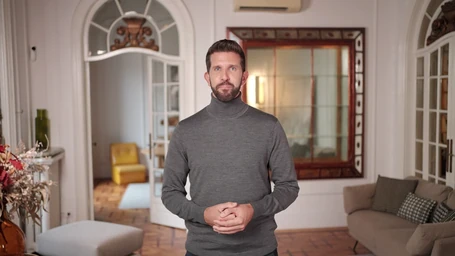
Meet Alex Kolek, your guide through the treacherous world of not sucking at public speaking. Once a sweaty-palmed, tongue-tied disaster in the corporate jungle, Alex spent years perfecting the art of blending into boardroom walls. But after one too many career-threatening presentations, he decided to grab the corporate bull by the horns. Through sheer desperation and a healthy dose of humor, Alex transformed himself from a public speaking coward into a presentation powerhouse. He climbed the corporate ladder, leaving a trail of impressed executives and engaged audiences in his wake.
Similar Posts

10 Inspiring Award Speech Examples for Your Next Acceptance Speech
Walking up to accept an award can feel like you’re about to battle a colossal beast, especially if the thought…

10 Heartfelt Maid of Honour Speech Examples for Your Sister’s Wedding
Crafting the perfect words for your sister\’s Maid of Honour speech can seem like a daunting task. Trust me, navigating…

Best Thanksgiving Speech Ideas and Examples for a Memorable Celebration
Crafting the perfect Thanksgiving speech can seem like a daunting task. I understand the trembles that come with the thought…

50 Unique Topics for Speeches to Impress Your Audience
Deciding on the perfect topic for a speech can often feel like searching for a needle in a haystack. Believe…

10 Inspiring Welcome Speech Quotes for Any Occasion
Standing before a crowd, the weight of expectation can be daunting. I know that feeling all too well – the…

120+ Funny Persuasive Speech Topics For College Students: Engaging Ideas for a Hilarious Presentation
Selecting the ideal theme for a college presentation can feel like navigating through a maze – challenging and sometimes downright…

Narrative Speech
Narrative speech generator.
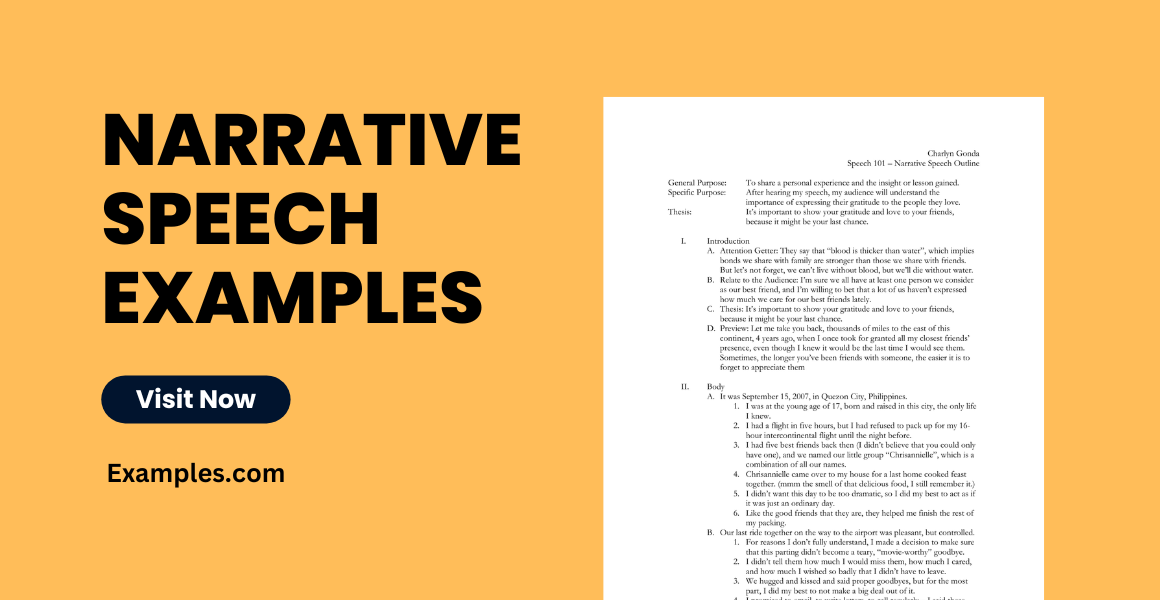
Try to let this scenario ply out in your head. It is the first day of school. You see children running around the hallways and the canteen. You see the teachers in the faculty room taking their 15-minute break before the start of the school bell at 7:30 in the morning. You see the high school students doing typical teenager things (e.g. texting, putting make up on, chatting the day away, sleeping, doing their homework at the very last minute, etc…). As the bell begins to ring, the students start to sing the country’s national anthem followed by a patriotic oath to the country then, sometimes the school hymn. You may also see narrative writings .
- Speech Examples
- Informative Speech
As the students take their seats, the first period teacher walks in the classroom and begins to introduce herself as Ms. Katniss Everdeen. As she was just finishing doing her introductions, the principal made an announcement requesting all the students and faculty to assemble in the school’s multi-purpose room for welcoming remarks of the first day of school. After settling down, the principal walked up to the stage and said: “Here to talk about pursuing your dreams at a young age, I would like to introduce to you the speaker of today’s special talk. You may also see personal narrative essay .
May we please give a special round of applause to none other than Eleven herself from Stranger Things, Millie Bobbie Brown?”
We all wish our first day of school was like that… Oh well. Now considering that you are placed in her shoes and will be asked to talk about a similar topic to that, how would you go about it?
Narrative Speeches
But then, you remembered something. It is actually not that difficult since this speech is all about you, and how that experience allowed you to become a better version yourself. Personal narrative speeches give focus on a specific real life event that served as a turning point for the writer. Speeches are often given as an assignment or a project by the teacher. But in order to write a strong personal narrative about yourself, try to think of an idea that might pique the audience’s curiosity.
Just like every good speech, great books, and awesome movies, it must have an introduction, the middle events, the climax, and finally, the end of the story. Here is an example of a personal narrative that might be able to help you out in writing your own personal narrative. You may also see informative speech .
Basic Personal Narrative Outline Example
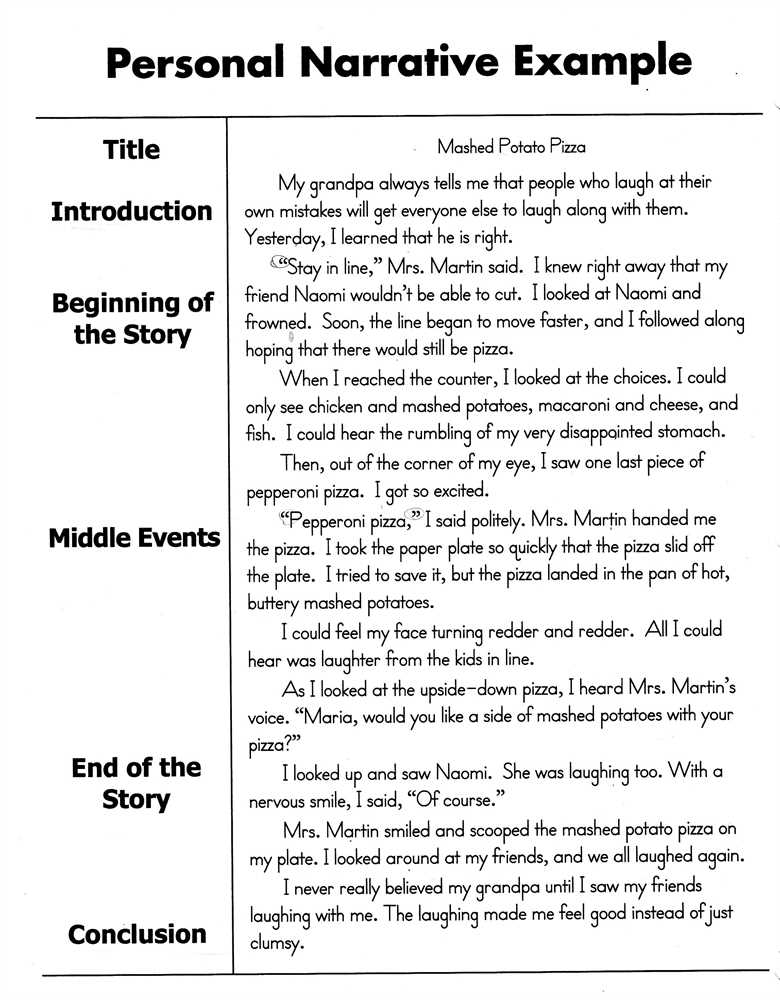
Size: 130 KB
Part 1. Brainstorming Ideas for the Narrative
Every good piece of literature or movie must always have a great idea to begin the story. Once you have an idea on what you would want to share with the audience, it makes things easier for you to explain as you just have to boil down to the specifics on what experiences can best go with the theme you are going to share. Listed below are some of the ways to brainstorm ideas:
Think of a memorable event or a moment in your life. Sure there are many moments and memories in your life that you have felt and experienced over the years. But there are only so few that have struck you to the depths of your soul that you cannot help but not forget that instance, even when you become old and gray. It does not have to be something major, it can even be as something simple as your first date with her and how you felt whenever she was with you. You may also see declamation speech .
For example, you can write about how your best friend stood up to you when you were getting bullied by a bunch of jerks in middle school or the time when you and your friends went to the club for the very first time and got wasted. You may also see launch speech .
Expand on an important conflict in your life. Everyone just loves watching drama. When you have found the perfect dramatic event to be included in your speech, include it in the speech and elaborate in detail. You may also see youth speech .
For example, you can write about the time your one and only best friend ditched you to start hanging out with those “plastic” losers and you were abandoned and treated like garbage afterwards by everyone in your class after your “best friend” spread some lies about you. You may also see graduation speech .
Think about a particular theme or idea. When deciding your speech, decide what the message you want to deliver the audience as a jumping off point for the narrative. Base your theme on your personal experiences that you would like to share. Once you have thought about it, ask yourself as to whether it has transformed you for the better or for the worst. Poverty, patience, sacrifice, and endurance are all good choices for a personal narrative. You may also see award speech .
For example, you may want to include in your experience on how a boy with no father or mother makes a living for himself by selling street food and how poverty has made you become more generous and thoughtful for others who are suffering on the streets. You may also see retirement speech .
Read examples of personal narrative. Finally, in order to write a good narrative, you must learn how others o it as well. To quote from the Jedi Master Yoda, he states: “You must unlearn what you have learned”. Very philosophical, but it is true. One cannot claim to know everything. And even if you did know everything, to learn something new, you must be open to change and new things in order to enhance and improve your skill. Here are some reading references you might want to glance at before starting:
- The Boys of My Youth by Jo Ann Beard
- Slouching Towards Bethlehem by Joan Didion
- Me Talk Pretty One Day by David Sedaris
- The Lives section of The New York Times
David Becomes King Narrative Speech Outline Example
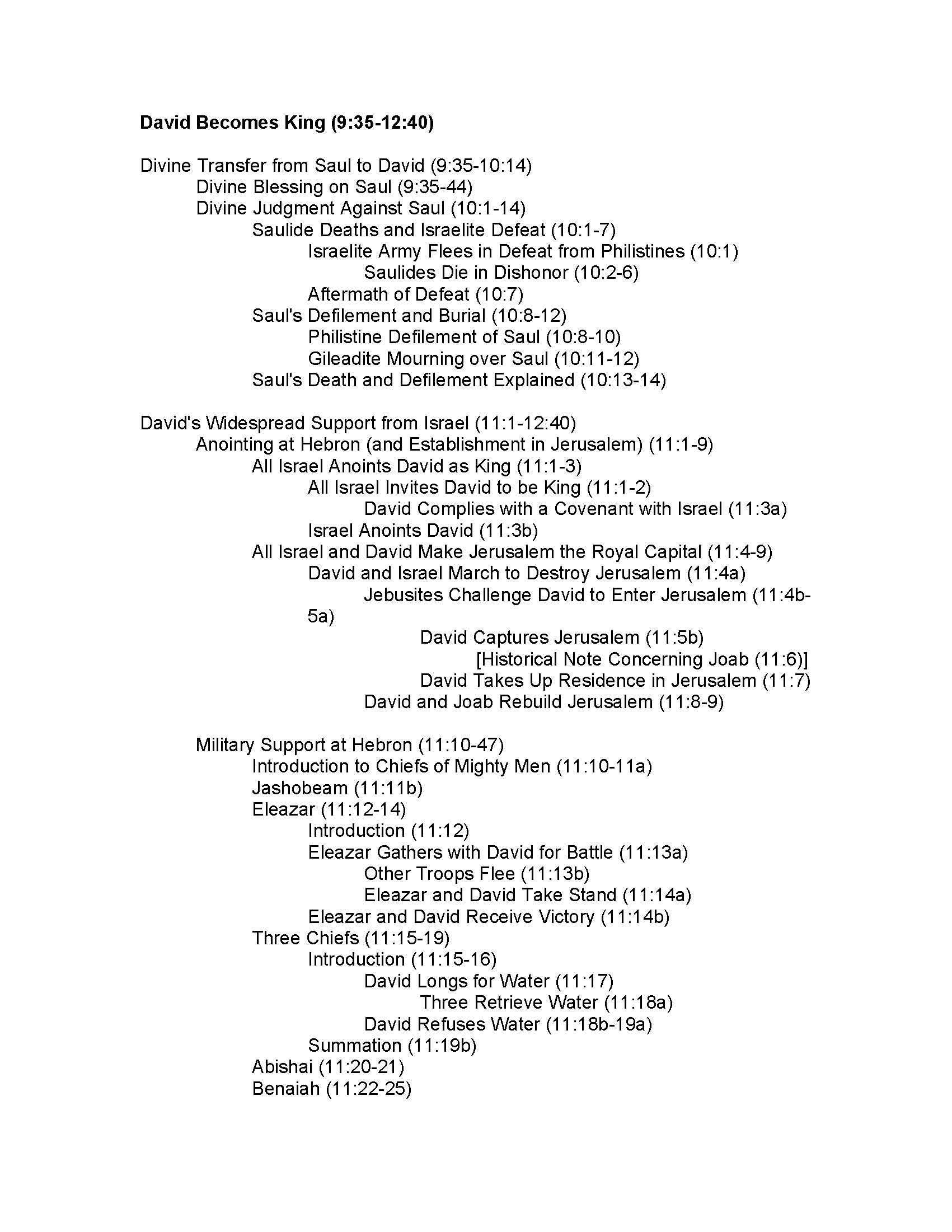
Size: 292 KB
Part 2. Writing the Personal Narrative
Now that you have brainstormed some ideas needed to start with your personal narrative, it is finally time to get to your computer and ignite the thought train full speed ahead.
Start with a hook. First impressions matter! If you have successfully bored out the audience in their chairs, then congratulations, only a few people are going to pay attention to what you have to say throughout the rest of your speech. Attention-grabbers often come in the form of a story, a quote, a personal experience. You may also see valedictorian speech .
For example, you can mention in the first line of your personal narrative: “I remember this one time when I accidentally slipped and fell down on the lake when I was fishing while everyone was staring at me.”
Set the scene with action. Every good story will not be complete without providing some background information and supporting details to the characters in your story.
Move chronologically through the events. When you begin your speech with your four year-old self accidentally drowning in a swimming pool just because he saw a slide and he wanted to get on it, do not immediately proceed to when you nine years old and you accidentally punched someone in the face because he was a jerk. It is important to set things in order as to avoid confusion between the timeline of your story. Finish explaining everything that occurred in event A before proceeding to event B and finally concluding with event C. You may also see acceptance speech .
Use sensory detail and description. They say it is important to show and not just simply to tell. Most speeches would allow visual aids or props to be presented at the front to give an audience a better idea on what the speaker is describing. But if not, then you must be able to use your imagination describing the object or event you have felt using the five senses. You may also see persuasive speech .
Finish with a moral or takeaway. Wrap your personal narrative up with a reflection or analysis of the transpired events. It is important that at the end of your speech, the audience is left with something to recall even if he forgets everything else. Allow them to leave the room with the moral and lessons that they have learned from your speech. You may also see elevator speech .
Speech 101 Narrative Speech Outline Example
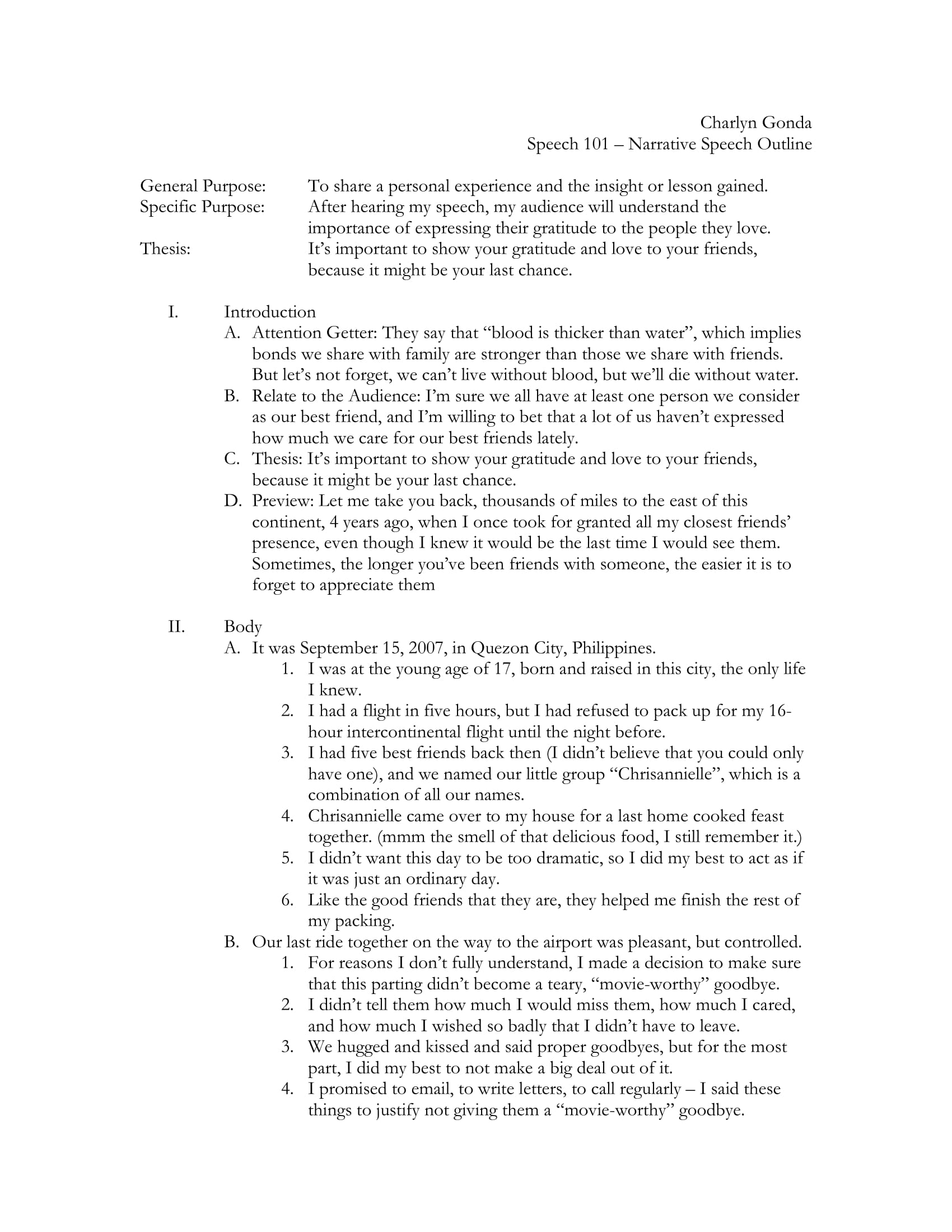
Size: 75 KB
At the end of the day, speech writing is one challenge. The next challenge is on how you are going to deliver it in front of the audience. You may refer to these examples for guidance if ever you are still struggling with writing a narrative speech. With that, we would like to end here and wish you the best of luck in your speech writing journey!
Text prompt
- Instructive
- Professional
Create a narrative speech about a life-changing travel experience
2. Help me write a narrative speech on overcoming adversity
My Speech Class
Public Speaking Tips & Speech Topics
Narrative Speech [With Topics and Examples]

Jim Peterson has over 20 years experience on speech writing. He wrote over 300 free speech topic ideas and how-to guides for any kind of public speaking and speech writing assignments at My Speech Class.
Narrative Speech Topics

- Your Events, Life Lessons, Personal Experiences, Rituals and Your Identity.
The main point is that you are talking about yourself.
Your thoughts, feelings, ideas, views, opinions and events are the leading ladies in this special public speaking speech writing process.
In this article:
Your Life Lessons
Experiences, narrative speech writing tips, 10 fast showcases.
Here are example narrative speech topics you can share in a speech class or other public speaking assignment in high school, college education. Narrow the speech topics appropriately to the public speaking occasion rules with the specialized checklist I have composed with seven narrative speech writing tips .
The checks and tips also serve as hooks for to narrate a paragraph in an college essay.
Can We Write Your Speech?
Get your audience blown away with help from a professional speechwriter. Free proofreading and copy-editing included.
The backbone of my advice is: try to keep the story devoted and dedicated. If you find it hard to develop speech topics for narration purposes and you are a little bit overwhelmed, then try ten ways I’ve developed to find narrative speech topics .
Most students mark out an event in their speeches and essays. An event that stipulate a great step in life or an important moment that has impact on your prosperity or lifestyle from that particular period:
E.g. An accident or remarkable positive event that changed my life. The birth of my brother, sister or other relative and the impact on our household and family-life. My first day at high school or college. The decision I regret most at my school or in my professional job career. My day of graduation (If you have not yet graduated from an educational institution, describe your hardworking and your planning efforts to achieve the qualification). My first serious date with my boyfriend / girlfriend. A significant family event in the summer. A memorable vacation. A historical event that impressed me. The day I will move overseas. A milestone that seemed bad but turned out to be good. My heroic sports moment at the campus field.
Take personal growth and development as starting point. Widen the horizon of the audience to a greater extent with narrative speech topics on wisdom. Construct a life lesson yourself, based on a practical wisdom acquired by own experience, or one you have been be introduced to by someone else:
E.g. The influence of a special person on my behavior. How I have dealed with a difficult situation. What lessons I have learned through studying the genealogy of my family. A prejudice that involved me. An Eureka moment: you suddenly understood how something works in life you had been struggling with earlier. How you helped someonelse and what you learned from her or him, and from the situation.
For this kind of public speaking training begin with mentioning intuitively the emotions you feel (in senses and mind) and the greater perception of the circumstances that lead to apprehension of a precarious situation:
E.g. My most frustrating moment. How you handled in an emergency situation. How I break up with my love. A narrow escape. A moment when you did something that took a lot of courage. A time when you choose to go your own way and did not follow the crowd. How I stood up for my beliefs. The day you rebelled with a decision concerning you. How you cope with your nerves recently – think about fear of public speaking and how you mastered and controlled it in the end. What happened when you had a disagreement with your teacher or instructor in class, this triggering narrative speech idea is great for speech class, because everyone will recognize the situation.
This theoretic method is close related to the previous tips. However, there is one small but significant difference.
Let’s define rituals as a system of prescribed procedures or actions of a group to which you belong. In that case you have the perfect starters to speak out feelings .
Complement the ritual with your own feelings and random thoughts that bubble up when you are practicing the ritual:
E.g. How you usually prepare for a test at high school or for a personality interview or questionnaire. Your ritual before a sports game. Your ritual before going out with friends – make up codes, choosing your dress or outfit, total party looks. The routines you always follow under certain circumstances on your way to home. Church or other religious rituals you think are important to celebrate. Special meditative techniques you have learned from old masters in East Asia.
These examples are meant to accent the cultural and personal charateristics based on values, beliefs and principles.
What do you think is making life worth living? What shaped your personality? What are the psychological factors and environmental influences?
And state why and how you ground your decisions:
E.g. My act of heroism. The decisions my parents made for me when I was young – school choice, admission and finance. How curiosity brings me where I am now. I daydream of … A place that stands for my romantic moments – a table for two in a restaurant with a great view. My pet resembles my personal habits. A vivid childhood memory in which you can see how I would develop myself in the next ten to fifteen years. Samples of self-reliance in difficult conditions, empathy towards others in society, and your learning attitude and the learning curve.
Make a point by building to a climax at the end of your speech topic, whatever the narrative speech topics may be you want to apply in some sort of public speaking training environment. Build your way to the most intense point in the development or resolution of the subject you have chosen – culminate all facts as narrator to that end point in your verbal account.
Narrative speech tips for organizing and delivering a written description of past events, a story, lesson, moral, personal characteristic or experience you want to share.
- Select carefully the things you want to convey with your audience. Perhaps your public speaking assignment have a time limit. Check that out, and stick to it.This will force you to pick out one single significant story about yourself.And that is easier than you think when you take a closer look at my easy ways to find narrative topics.
- What do you want your audience to remember after the lapse?
- What is the special purpose, the breaking point, the ultimate goal, the smart lesson or the mysterious plot?
- Develop all the action and rising drama you need to visualize the plot of the story: the main events, leading character roles, the most relevant details, and write it in a sequence of steps. Translate those steps into dialogues.
- Organize all the text to speech in a strictly time ordered format. Make a story sequence. Relate a progression of events in a chronologically way.The audience will recognize this simple what I call a What Happened Speech Writing Outline, and can fully understand your goal. Another benefit: you will remember your key ideas better.It can help if you make a simple storyboard – arrange a series of pictures of the action scenes.
- Build in transition sentences, words or phrases, like the words then, after that, next, at this moment, etc. It helps to make a natural flow in your text.
- Rehearse your narrative speech in front of a friend and ask opinions. Practice and practice again. And return to my narrative speech topics gallore if you get lost in your efforts.Avoid to memorize your text to speech. When you are able to tell it in a reasonably extemp manner – everyone can follow you easily – it is okay.
- Finally, try to make eye contact with your listeners when you deliver this educational speech and apply my public speaking tips one by one of course.
- A good place to start finding a suitable narrative speech topic is brainstorming about a memorable moments in your life, a situation you had to cope with in your environment, a difficult setting or funny scene you had to talk your way out.
Try to catch it in one phrase: At X-mas I … and followed by a catchy anf active verb.
E.g. At X-mas I think … I want … I’m going … I was … I stated … I saw … .
After the task verb you can fill in every personal experience you want to share with your public speaking audience in a narration. These 40 speech topics for a storytelling structure can trigger your imagination further.
My most important advice is: stay close to yourself, open all your senses: sight, hearing, taste, and even smell and touch. Good for descibing the memorable moment, the intensity of it.
- A second way to dig up a narrative speech topic is thinking about a leading prophetic or predictive incident in the previous 10 years or in your chidhood. Something that illustrates very well why and how you became who you are right now.
E.g. Your character, moral beliefs, unorthodox manner of behaving or acting or you fight for freedom by not conforming to rules, special skills and qualities.
- The third way I like to communicate here with you is storytelling. Let yourself be triggered for a narrative speech story by incidents or a series of events behind a personal photograph or a video for example.
E.g. Creative writing on a photo of your grand-grandparents, of a pet, a horse, an exciting graduation party, a great architectural design.
- You also can find anecdotal or fictional storylines by highlighting a few of your typical behavior or human characteristics.
E.g. Are you a person that absorbs and acquires information and knowledge, likes to entertain other people or nothing at all? Or are you intellectually very capable in solving comprehensive mathematical calculations? Or are you just enjoying life as it is, and somewhat a live fast die young type?
Or a born organizer – than write speech topics about the last high school or college meeting you controlled and administered.
- The fifth method I would like to discuss is the like or not and why technique. Mark something you absolutely dislike or hate and announce in firm spoken language (still be polite) why. A narrative speech topic based on this procedure are giving insight in the way you look at things and what your references are in life.
It’s a bit like you make a comparison, but the difference is that you strongly defend your personal taste as narrator. It has a solid persuasive taste:
E.g. Speeches about drilling for oil in environmental not secure regions, for or against a Hollywood or Bollywood movie celebrity, our bankingsystem that runs out of trust of you the simple bank account consumer. Or your favorite television sitcom series.
- An exciting, interesting, inspiring or funny experience or event that changed your life is the next public speaking tip I like to reveal now.
E.g.? Staying weekends at your uncle’s farm shaped you as the hardworking person you are nowadays. A narrative speech topic in this category could also be about music lessons, practical jokes. Or troublesome events like divorce, or great adventures like trips at the ocean. Or even finding faith or a wedding happiness.
And what do you think of extreme sports tournaments?
- An important lesson you learned from someone you admire. This is a very classical narrative speech topic.
It tends to be a little bit philosophical, but if you tell you story people will recognize what you mean and compare that with their own stories and wisdom lessons.
Tell the story of a survivor of a traffic accident, and how you admire her or his recovery. Winners of awards, great songwriters, novelists, sportsheroes.
This list is almost exhaustive. Share the wisdom of their fails and achievements.
- The moment in your life you see the light, or that was very insightful. It seems a bit like my number six advice, but focus more on the greatness and happiness of that very moment. A moment’s insight is sometimes worth a life’s experience, American Judge Oliver Wendell Holmes have said.
Magnificent and breath-taking nature phenomenons, precious moments after a day of struggle, final decisions that replenish, lift your spirit.
- A fable or myth that has a moral lesson you try to live to.
Aesop Fables are a great source for a narrative speech topic idea structure. Think about The Dog and His Reflection, The Fox and The Grapes, and Belling the Cat. Talking about fairy tales as an inspiring source: what do you think of a personal story about the moral of The Emperor’s New Clothes?
- The relation between a brief series of important milestones in your life that mold your character is also possible – if catchy narrated storytelling of course :-).
First day of school, first kiss, Prom Night, your high school graduation, wedding, first job interview.
Christening Speeches
Pet Peeve Speech Topics
Leave a Comment
I accept the Privacy Policy
Reach out to us for sponsorship opportunities
Vivamus integer non suscipit taciti mus etiam at primis tempor sagittis euismod libero facilisi.
© 2024 My Speech Class

How to Write and Deliver a Compelling Narrative Speech (With Examples)
- The Speaker Lab
- August 8, 2024
Table of Contents
If you want to elevate your public speaking game, storytelling is one of the best ways to do so. By weaving captivating tales into your presentations, you’ll forge a powerful emotional bond with your audience in a way you can’t with mere data and statistics. Not sure where to begin? Look no further than these narrative speech examples , designed to spark your creativity and help you craft your own compelling narratives.
From personal anecdotes to historical tales, these examples will demonstrate the power of storytelling to engage, persuade, and inspire. You’ll also see how great speakers use vivid language, descriptive details, and relatable characters to draw their listeners in and keep them hanging on every word. So get ready to take notes, because you’re about to unleash your inner storyteller!
What Is a Narrative Speech?
If you’ve ever been captivated by a great story, then you know the power of storytelling. A narrative speech is a type of speech that uses a personal story or narrative to engage the audience and illustrate a point. It’s one of the most effective ways to connect with your listeners on an emotional level.

Elements of a Good Narrative Speech
So, what makes a good narrative speech? First and foremost, it needs to have a clear beginning, middle, and end. Your story should have a strong opening that hooks the audience, a compelling middle that builds tension and keeps them engaged, and a satisfying conclusion that ties everything together.
If you want your story to pack a punch, don’t skimp on the specifics. Describe what you experienced using the five senses: sight, hearing, smell, touch, and taste. When you paint a vivid picture with your words, your audience will feel like they’re right there with you, experiencing every thrilling moment firsthand.
Benefits of Giving a Narrative Speech
But why bother with a narrative speech in the first place? Because stories have the power to change hearts and minds. They allow you to connect with your audience on a personal level, making your message more memorable and impactful. Think about it—when was the last time a list of facts and figures moved you to tears or inspired you to take action? Probably never. But a well-told story? That can stay with you for a lifetime.
Learn How You Could Get Your First (Or Next) Paid Speaking Gig In 90 Days or Less
We receive thousands of applications every day, but we only work with the top 5% of speakers .
Book a FREE call with our team to get started — you’ll learn why the vast majority of our students get a paid speaking gig within 90 days of finishing our program .
How to Choose a Topic for Your Narrative Speech
Now that you’ve unlocked the potential of narrative speeches, the next step is selecting the perfect topic. Look for a narrative that not only resonates with you on a personal level but will also strike a chord with your audience.
Brainstorming Ideas
Start by brainstorming speech topics that are meaningful to you. Think about pivotal moments in your life, lessons you’ve learned, or challenges you’ve overcome. Consider stories that highlight your values, passions, or unique experiences.
One brainstorming technique is to make a list of “firsts”—first love, first job, first big failure, etc. These moments often make for compelling stories because they’re relatable and emotionally charged.
Narrowing Down Your Options
Once you have a list of potential topics, it’s time to narrow them down. Ask yourself which stories are most relevant to your audience and the message you want to convey. Which ones have the most dramatic arc or the most valuable lessons?
You also want to consider your comfort level with each story. Some stories may be too personal or emotionally raw to share in a public setting. Others may not have enough substance to sustain a full speech. Trust your gut and choose the story that feels right for you.
Ensuring Your Topic Is Engaging
Finally, make sure your chosen topic is engaging and compelling. A good story should have some sort of conflict or tension that keeps the audience on the edge of their seats. It should also have a clear theme or message that resonates with listeners.
To determine if your story is a crowd-pleaser, put it to the test by sharing it with your inner circle. As you weave your narrative, watch closely for signs of engagement or boredom. Then, afterwards, ask for feedback on how you can improve your narrative speech—and don’t be afraid to ask for examples of how you might re-write specific sections. Jot down these suggestions and use them to fine-tune your story, ensuring it’s a hit with any audience.
Crafting an Outline for Your Narrative Speech
Now that you’ve nailed down your topic, it’s time to roll up your sleeves and craft a speech outline . Trust us, having a clear roadmap will make all the difference when it comes to delivering your message with confidence and clarity.
Introduction
Begin your speech with a hook, something that will pique your audience’s interest and encourage them to keep listening. Oftentimes, speakers like to use a shocking statistic or a captivating anecdote to kick things off.
For example, if your narrative speech is about overcoming a fear of public speaking , you might start with something like, “Imagine standing in front of a room full of people, your heart racing, your palms sweating, your mind going blank. That was me, just a few years ago.”
The body of your speech is where you’ll tell your actual story. Break it down into clear, chronological segments with smooth transitions between each part. Use vivid details and sensory language to bring the story to life.
As you’re writing, consider incorporating dialogue, humor , or suspense to keep the audience engaged. You might also use rhetorical devices like repetition or metaphor to drive home your key points.
As you wrap up your story, consider the bigger picture. What insights did this journey reveal to you? How have you grown as a person because of it? Think about the key takeaway you want to leave with your readers—something that will stick with them long after they’ve walked away.
End with a call-to-action or a thought-provoking question that encourages the audience to reflect on your message. You might also circle back to the opening anecdote or question to create a sense of closure.
Incorporating Characterization Techniques
To make your story more engaging, consider incorporating characterization techniques. This means giving your characters distinct personalities, motivations, and quirks that make them feel like real people.
Firstly, bring your characters to life through their conversations. The words they choose, their facial expressions, and even their body language can speak volumes about who they are and what makes them tick.
Secondly, to help your audience visualize your characters, use rich descriptions of their physical attributes, fashion choices, and distinct behaviors. Paint a picture of what they look like, how they present themselves through their attire, and any idiosyncrasies that define who they are. By bringing your characters to life, you’ll make your story more relatable and memorable for the audience.
In order to create a narrative speech that truly stands out , you’ll need to put in the time and effort to refine your craft. The reward? An opportunity to share a personal story that not only entertains but also motivates and inspires your audience, forging a connection that lasts long after the final word is spoken.
Delivering Your Narrative Speech Effectively
Before we get to narrative speech examples, let’s take a look at speech delivery. Speech delivery isn’t just about the words you say, but how you say them. Your body language, eye contact, and vocal delivery all play crucial roles in engaging your audience and making your story memorable.
In addition, practice until you can recite your story in your sleep. When you know your content like the back of your hand, you can focus on engaging with your listeners and making your words come alive.
Practicing Your Speech
Rehearsing your speech is of utmost importance. It’s a step that many speakers overlook, but it can make a world of difference in your delivery. When you practice, you familiarize yourself with the flow of your story, allowing you to speak more naturally and confidently.
One technique you find particularly helpful is recording yourself delivering the speech. When you watch the playback, you can identify areas where you need to improve your vocal variety, adjust your speaking rate , or refine your body language. It’s a powerful tool for self-critique and growth as a speaker.
Engaging Your Audience
When you take the stage, your focus should be squarely on those who have gathered to hear you. Eye contact is just the beginning; truly engaging your audience means creating a genuine connection and making them feel like they’re right there with you, experiencing your story firsthand. Try using words like “we” and “us” to make your audience feel included. Asking questions can also get them thinking about what you’re saying.
Using Props and Visual Aids
Your narrative speech may revolve around your words, but don’t underestimate the impact of a carefully selected prop or visual aid. These tools can make abstract ideas tangible, evoke strong emotional responses, and ensure your message lingers long after you’ve left the stage.
However, it’s important to use these tools judiciously. Overreliance on props or visuals can distract from your message and undermine your credibility as a speaker. When selecting props or creating visual aids, always ask yourself: does this add value to my story, or is it just a gimmick?
Overcoming Nervousness
Even seasoned speakers get the jitters sometimes. Before stepping up to the mic, take a moment to ground yourself with some breathing exercises. Visualize yourself delivering your story with confidence and poise, and watch as that nervous energy transforms into pure charisma on stage.
Remember, your listeners are your biggest supporters. They’ve gathered to hear your unique perspective and leave feeling uplifted. Rely on the effort you’ve put in, breathe deeply, and allow your fervor for your message to radiate throughout the room.
Examples of Compelling Narrative Speeches
Great speakers have always known the secret to capturing an audience’s attention: storytelling. Whether it’s an ancient Greek orator spinning a yarn or a modern-day TED Talker sharing a personal journey, the ability to craft a compelling narrative is what sets the best speakers apart. So, what do these narrative speeches look like in action? Let’s dive into some narrative speech examples that have educated, inspired, and motivated people across the ages.
Inspirational Stories
Inspirational stories are those that uplift and motivate us to be our best selves. They often involve overcoming adversity, achieving a seemingly impossible goal, or making a positive difference in the world. Take, for example, Amy Purdy’s narrative speech about the power of imagination. In case you aren’t familiar with the name, Amy Purdy is a Paralympic snowboarder who lost both her legs below the knee due to bacterial meningitis. In her TED talk, she shares her journey of resilience and adaptation, showing how she turned a devastating setback into an opportunity to inspire others.
Humorous Anecdotes
Want to instantly connect with your audience? Try sprinkling in some humor. A well-timed joke or absurd anecdote can break the ice and leave your listeners in stitches. Keep them on their toes with unexpected twists, and they’ll be hanging on your every word.
Darren LaCroix, a professional speaker, frequently uses humorous stories in his talks. Take a look at how he uses his stories of failure in this speech to motivate his crowd to chase their dreams.
Emotional Tales
Emotional tales have a way of grabbing our hearts and not letting go. These stories frequently revolve around individual challenges, the pain of loss, or powerful moments of clarity that reshape a person’s path forward.
One example of an emotional narrative speech is Steve Jobs’ 2005 Stanford Commencement Address , in which he shares three personal stories that shaped his philosophy on life and work. From his adoption story to his battle with cancer, Jobs’ tales are raw, honest, and deeply moving.
Motivational Narratives
Ever heard a story that made you want to jump up and take on the world? That’s the power of a motivational narrative. These inspiring tales feature everyday people doing incredible things—conquering challenges, chasing their passions, and proving that with hard work and determination, anything is possible.
If you want to hear an inspiring tale, check out J.K. Rowling’s Harvard Commencement Speech . She shares her personal journey of failure and resilience, and how she used her imagination to create one of the most adored book series ever. It’s a beautiful story about the power of storytelling and never giving up on your dreams.
Want to hook your audience, tug at their heartstrings, and spur them to action? Take a look at some narrative speech examples from those who’ve mastered the craft. But as you do, don’t forget: your story, told in your unique voice, is the most powerful tool you have. Share it boldly, and watch as it transforms lives.
Find Out Exactly How Much You Could Make As a Paid Speaker
Use The Official Speaker Fee Calculator to tell you what you should charge for your first (or next) speaking gig — virtual or in-person!
FAQs on Narrative Speech Examples
How do you start a narrative speech.
Kick off with a hook that grabs attention. Maybe share an unexpected fact, ask a thought-provoking question, or launch into the heart of your tale.
What is an example of storytelling?
An example would be recounting how overcoming acute anxiety before a big job interview taught resilience and self-confidence.
Dive straight into setting the scene or introduce your main character in action. Let listeners feel they’re right there with you from the get-go.
What are examples of narrative speech?
Narrative speeches might explore personal growth through volunteering experiences or share humorous anecdotes about learning to drive. They weave personal stories to engage and enlighten audiences.
Storytelling is a timeless art that has the power to captivate, inspire, and transform. By studying these narrative speech examples, you’ve seen firsthand how weaving narratives into your presentations can create an emotional connection with your audience and make your message unforgettable.
In order to engage your audience, focus on your characters. Additionally, include details that engage the senses. And don’t be afraid to get a little personal. After all, your own experiences can be the most powerful stories of all.
With these tips in mind, go forth and tell your stories with passion, authenticity, and purpose. Your audience is waiting to be inspired by the narratives only you can tell. Happy storytelling!
- Last Updated: August 6, 2024

Explore Related Resources
Book a call with our team to get started — you’ll learn why the vast majority of our students get a paid speaking gig within 90 days of finishing our program .
If you’re ready to control your schedule, grow your income, and make an impact in the world – it’s time to take the first step. Book a FREE consulting call and let’s get you Booked and Paid to Speak ® .
About The Speaker Lab
We teach speakers how to consistently get booked and paid to speak. Since 2015, we’ve helped thousands of speakers find clarity, confidence, and a clear path to make an impact.
Get Started
Let's connect.
Copyright ©2023 The Speaker Lab. All rights reserved.

Valparaiso Library Guides
Comm 101: fundamentals of public speaking - valparaiso.
- Delivery Skills
- Stage Fright
- Body Language / Non-Verbal Communication
- Listening Skills
- Quotation Resources
- Speech Outline Examples
- Speech Examples
- More Speech Examples
- Presentation Options
- Citation Resources This link opens in a new window
A basic speech outline should include three main sections:
- The Introduction -- This is where you tell them what you're going to tell them.
- The Body -- This is where you tell them.
- The Conclusion -- This is where you tell them what you've told them.
- Speech Outline Formatting Guide The outline for a public speech, according to COMM 101 online textbook The Public Speaking Project , p.p. 8-9.
Use these samples to help prepare your speech outlines and bibliographies:
- Sample Speech Preparation Outline This type of outline is very detailed with all the main points and subpoints written in complete sentences. Your bibliography should be included with this outline.
- Sample Speech Speaking Outline This type of outline is very brief and uses phrases or key words for the main points and subpoints. This outline is used by the speaker during the speech.
- << Previous: Quotation Resources
- Next: Informative Speeches >>
- Last Updated: Nov 15, 2024 11:13 AM
- URL: https://library.ivytech.edu/Valpo_COMM101
- Ask-a-Librarian
- [email protected]
- (219) 464-8514 x 3021
- Library staff | Find people
- Library Guides
- Student Life & Activities
- Testing Services
- Ivy+ Textbooks
- Games, topic printables & more
- The 4 main speech types
- Example speeches
- Commemorative
- Declamation
- Demonstration
- Informative
- Introduction
- Student Council
- Speech topics
- Poems to read aloud
- How to write a speech
- Using props/visual aids
- Acute anxiety help
- Breathing exercises
- Letting go - free e-course
- Using self-hypnosis
- Delivery overview
- 4 modes of delivery
- How to make cue cards
- How to read a speech
- 9 vocal aspects
- Vocal variety
- Diction/articulation
- Pronunciation
- Speaking rate
- How to use pauses
- Eye contact
- Body language
- Voice image
- Voice health
- Public speaking activities and games
- Blogging Aloud
- About me/contact
- examples of narrative speech topics
Examples of narrative speech topics
125 strong ideas for effective personal storytelling speeches
By: Susan Dugdale
Narrative speech topics are topics especially designed to trigger telling a story.
And who doesn’t love being told a good story? They’re universally appreciated. It’s the oldest, most effective way of emphasizing a point, illustrating an idea or recounting an event.
For as long as there have been people in the world, there have been people telling them stories: storytellers.
What's on this page:
- 125 examples of narrative speech topics: - 40 'first' experiences , - 40 tell-a-story topics , - 35 personal story ideas
- How to best use this page
Choosing the right narrative speech topic
- How to get from topic to speech (with a printable speech outline to download)
A definition of the word 'narrative'
A personal story is a powerful story, the difference between an anecdote and a story.
- Additional resources for storytelling speeches
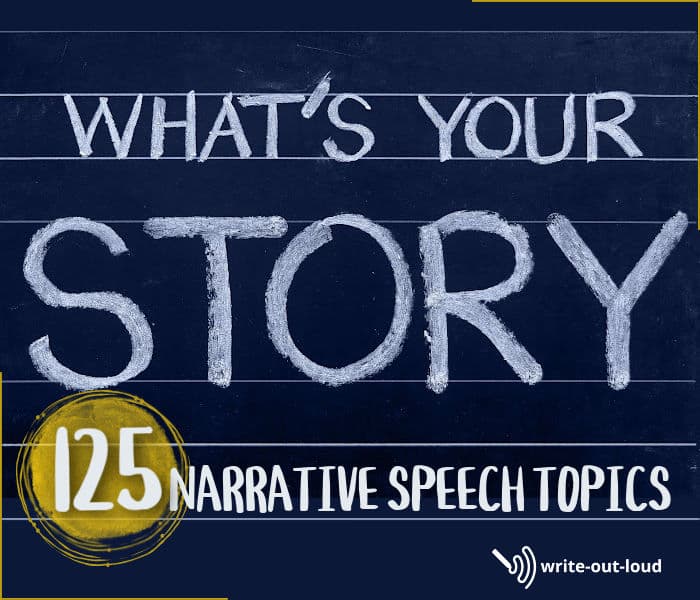
How to make best use of this page
Browse the topics and make a shortlist of any that appeal to you. (These are the ones that will immediately have you thinking of stories you could share.)
Make sure you download the printable narrative speech outline. Then take what you need from the other information. (If you've never given a narrative or storytelling speech before, read all of it!) It's here to help you put together the best speech you possibly can. ☺
The most powerful stories to tell are personal. They’re the game changers, the significant events: meetings, accidents, cultural jolts, and life lessons that have made an impact.
They’re stories about family, our children, love, marriage, politics, education, work, living in society, philosophy, the natural world, ...
In telling these stories we reveal aspects of ourselves: sharing our innermost thoughts and feelings.
To give a good narrative speech, one that fully engages our audience we need to:
- choose a meaningful story with strong characters they can relate to in a situation they’ll recognize and identify with
- use vivid language enabling them to easily picture and feel what’s happening
A spoken or written account of connected events; a story: "a gripping narrative"
Word with similar meanings: account, story, tale, chronicle, history, description, record.
(Definition from Oxford Languages )
Because narrative speeches are often stories about ourselves we need to think carefully about what we share and with whom.
Some subjects are sensitive for many reasons. And what could be completely appropriate in one setting could be quite wrong in another.
As the giver of the speech, you’ll want to be clear about what you’re sharing and why.
Additionally, an emotional narrative speech exposing your own deeply felt and unresolved issues would be difficult for an audience to witness.
They’d want to help, send you to a therapist, leave... People do not want to feel embarrassed or uncomfortable on your behalf.
The right narrative topic idea is one you know your audience will want to hear, fits the speech purpose you’ve been given, and one you feel comfortable sharing.
Should you decide to use someone else's story for your speech be sure to acknowledge whose it is and where you got it from.
Getting from topic to speech
Once you’ve decided on your topic, the next step is developing a story outline. That involves carefully thinking through the sequence of the story, or what you’re going put in it, scene by scene and why, from beginning to end.
To help you do that easily I've put together a printable narrative speech outline. To download it click on the image below. (The pdf will open in a new window.)
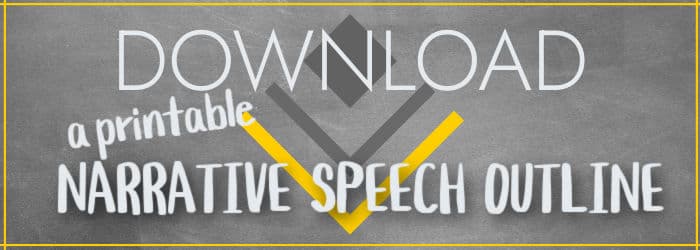
The outline will guide you through each of the steps you need to complete. (Instructions are included.)
Rehearsal, rehearsal, rehearsal
Once your outline is done, your next task is rehearsing, and then rehearsing some more. You’ll want to know before you give the speech that it:
- makes sense and can be followed easily,
- grabs and holds the audience’s attention, is relevant to them,
- and easily fits the time you’ve been given.
Rehearsal lets you find out in a safe way where any glitches might be lurking and gives you an opportunity to fix them.
It also gives you time to really work at refining how you tell the story.
For instance, what happens if this part is said softly and slowly? Or if this bit is delivered more quickly, and that has a long pause after it?
And what about your body language? Are you conscious of what you’re actually doing as you speak? Do you ‘show’ with your body and how you use your voice, as well as ‘tell’ with your words?
The way you tell a story makes an enormous difference to how it is received. A good story can be ruined by poor delivery. If you make the time to practice, that’s largely avoidable.
- For more on how to rehearse – a step-by-step guide to rehearsing well
- For more on the vocal aspects of speech delivery
- For more on developing effective body language
Many people share an anecdote thinking they’re telling a story. They’re not. Although they have similarities, they are different.
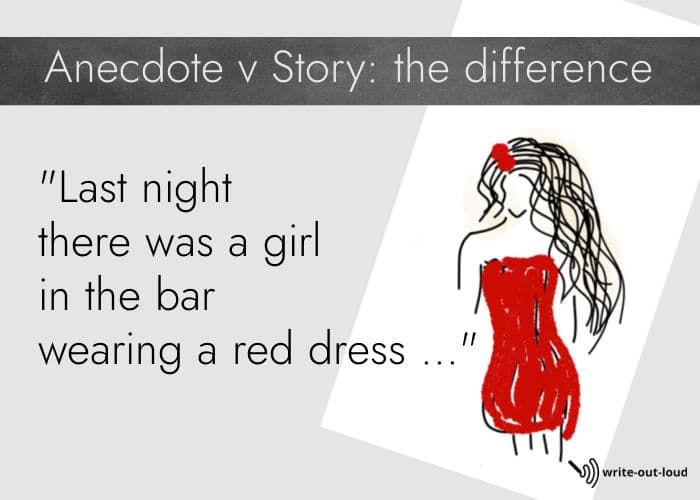
An anecdote is a series of facts, a brief account of something that happened. It is delivered without interpretation or reflection. It’s a snapshot cut from a continuum: a slice of life. We’ve taken notice because it was interesting, strange, sad, amusing, attractive, eccentric...to us. It captured our attention in some way.
For example:
"Last night there was a girl in the bar wearing a red dress. She ordered a brandy. After she finished her drink, she left."
In contrast, a story develops. It travels from its starting place, goes somewhere else where something happens, and finally arrives at a destination. A story has a beginning, a middle and an end. It moves. Things change.
Here’s the same anecdote example reworked as a very brief story. The person telling it is reminiscing, talking about the past to girl called Amy.
"Last night there was a girl in the bar wearing a red dress—so young, so gorgeous, so full of life. Seeing her whirled me back to us. You and me and that song. Our song: Lady in Red. “The lady in red is dancing with me, cheek to cheek. There's nobody here, it's just you and me. It's where I want to be.”
The complete and abrupt shift from present to past overwhelmed me. Thoughts, feelings, memories... At twenty-five and twenty-six we knew it all and had it all.
When I looked up, she’d finished her drink and gone. Oh, Amy! What did we do?"
Narrative speech topic ideas: 40 firsts
Often the first time we experience something creates deep lasting memories. These can be both very good and very bad which makes them an excellent foundation for a gripping speech.
We love listening to other people’s dramas, especially when they’ve gone through something significant and come out the other side strengthened – armed with new knowledge.
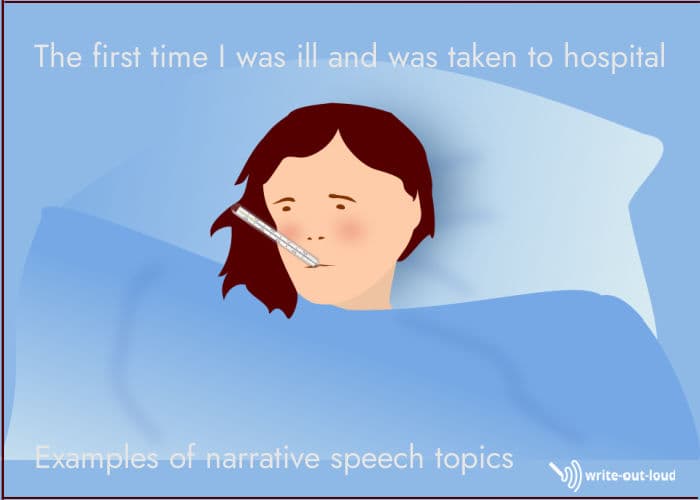
- The first time I stood up for myself.
- The first time I drove a car.
- The first time I rode a bike.
- The first time I fell in love.
- The first time I felt truly frightened.
- The first time I realised my family was different.
- The first time I understood I was different from other kids.
- My first day at a new school.
- The first time I felt truly proud of myself.
- My first date.
- My first job interview.
- The first time I realised no matter how hard I tried I was never going to please, or be liked, by everybody.
- How I got my first paid job.
- What I did with my first pay.
- My first pet.
- My first real fight- what it was about, and what I learned from it.
- The first time I tried hard to achieve something and failed.
- The first time I realised some people are not to be trusted.
- The first time I was away from home on my own.
- The first time I had to ask a stranger for help.
- The first time I experienced what it’s like to have someone close be either seriously ill or die
- The first time I was ill and was taken to hospital.
- The first time I felt utterly filled with happiness.
- The first time I was sincerely impressed and influenced by another person’s goodness.
- My first pin up hero.
- My childhood home – what I remember – the feelings and events I associate with it.
- The first time I realised the color of my skin, or the shape of my body, or my face, or my gender, or anything else about me, made a difference.
- The first time I tried to communicate with someone who did not speak my language.
- The first time I saw snow, the sea, climbed a mountain, camped out under the stars, walked a wilderness trail, caught a wave...
- The first time I visited another country where the language, customs and beliefs were vastly different to my own.
- The first time I understood and experienced the power of kindness.
- The first time I told a lie.
- The first time I understood how fortunate I was to be me.
- The first time I realised my goals and aspirations were attainable.
- The first time I realised having enough money to do whatever I wanted could not buy happiness.
- The first time I realised that some people were always going to be better at some things that I was.
- The first TV show/film/book I loved and why.
- The first time I really understood I was prejudiced.
- The first time someone stepped up for me – what that felt like, and what it changed.
- How first impressions of people and/or an event are not always right.
40 tell-a-story speech topics
Here's another 40 narrative speech suggestions. Give yourself time as go through them to consider suitability of the stories they trigger. Would what you're thinking of suit your audience? Does it fit your overall speech purpose?
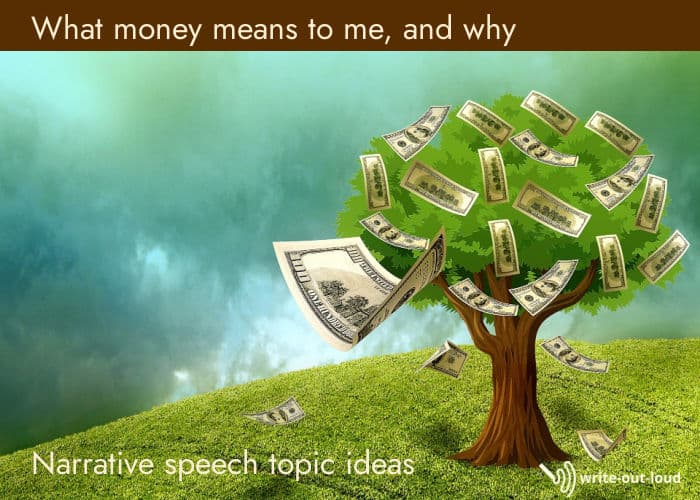
- How I learned to stand up for my own beliefs.
- How my name influenced who I am.
- My favorite teacher – why, what did they do? How did that make you feel?
- When and how I learned being adult does not mean being grown up.
- Why winning is important to me.
- What terrified me as a child.
- How I learned to manage my anger.
- What people regularly assume about me and how that makes me feel.
- How having an animal to love made me a better human being.
- How humor defuses tension.
- What it feels like to rebel against authority, and why I do it.
- My learning break through.
- How I discovered what meant the most to me.
- How I learned my family was poor, rich, odd, ...
- When I fully realized the importance and power of community.
- What I learned through living through my parent’s divorce.
- My experience of being an outsider.
- My favorite way to unwind.
- A decision I made that I now regret and why.
- How goal setting has helped me achieve.
- My safe place.
- What being unfairly punished taught me about myself.
- Rituals that serve me well. For example, always cleaning my teeth a particular way, always sorting my clothes out for the following day before I go to bed, always making Christmas presents for my family, ...
- What money means to me and why.
- How being a parent fundamentally changed me,
- What being the underdog taught me.
- Why I chose my own path, and not the one my parents wanted for me,
- Why family celebrations are important to me.
- Why I adopted a child.
- What religion means to me.
- What marriage, friendship,... means to me.
- What needing to be helped has taught me.
- Why and how I support giving back to the community.
- Tricks I use to get myself to do things I know I should do but don’t really want to.
- What I do to manage fear or anxiety of public speaking.
- How I learned to stop biting my finger nails or stop some other behaviour driven by nervous anxiety.
- How I learned to stop feeling like my job in life was to make my parents or anybody else feel happy.
- What having a job as a young person taught me.
- The complications of being the favorite child in your family.
- The difficulties of having to choose between friends.
35 more narrative or personal story speech topics
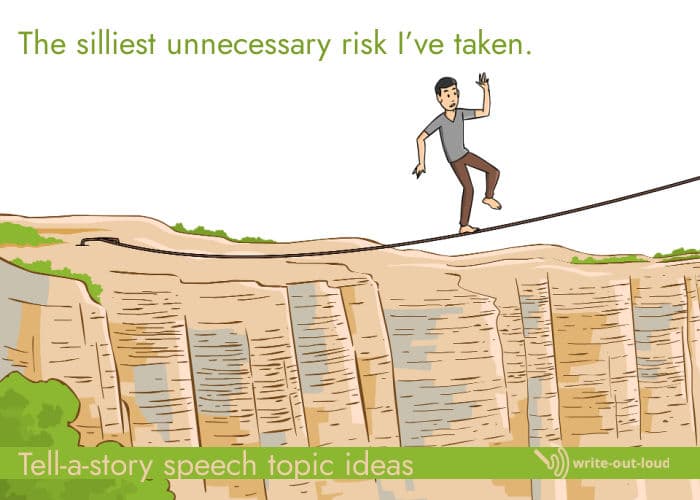
- The time I made an assumption about a situation or a person and got it entirely wrong.
- What being totally and suddenly out of my depth in a situation felt like and the consequences.
- A lesson I learned the hard way that helped me become a better person. For example: over spending, driving too fast, drinking too much, being caught out in a lie...
- Important things I learned through keeping old people company.
- What I learned through losing a good friend
- What coming face to face with my own mortality taught me.
- How the language of kindness transcends language and cultural differences.
- What being ashamed of my own behaviour taught me.
- How I unknowingly broke local cultural customs while overseas and what happened
- How taking revenge for a wrong did not right it.
- The silliest unnecessary risk I’ve taken.
- How first impressions are not always right.
- How pretending to be strong (fake it until you make it) can work very well.
- What I really wanted my parents to do for me and they didn’t.
- How our clothing influences how other people perceive us.
- My earliest memories: what they were, how they made me feel.
- Why I became disillusioned about politics.
- Why I decided to go into politics.
- The influence of music on my life.
- A personal phobia and how it impacts on my life: fear of spiders, fear of the dark, fear of thunder...
- The impact of peer pressure on decision making.
- What I’ve learned about gratitude.
- How I lied in order to cover for a friend and what happened.
- My most embarrassing moment and how I survived it.
- The worst day of my life: what it taught me.
- How I know peer pressure can make us behave in ways we don’t really want to.
- How I learned to read people.
- Why saying thank you is important.
- Random acts of kindness and generosity.
- Being lost in a strange city.
- What I learned through genuinely apologizing for something I did.
- How the way a person speaks influences what we think about them.
- How a mentor changed my life.
- The most thrilling exciting thing I’ve done.
- How being a leader and being looked up to felt.
Other resources for narrative speeches
Pages on this site:
- 60 vocal variety and body language speech topics - speech ideas to encourage excellent storytelling
- Storytelling setups: what works & why - How to open or lead into a story
- How to effectively use a small story as part of a speech
- Tips and exercises for working with and improving body language
- Simple characterization techniques for compelling storytelling
- 9 aspects of vocal delivery - explanations, tips and exercises to improve your voice
- How to rehearse well - step by step guidance
Offsite storytelling speech resources
- 5 creative storytelling projects recommended by teachers, for everyone | (ted.com)
Toastmasters Project | Connect with storytelling – Level Three
- Connect with Storytelling – District One (district1toastmasters.org)
- 8300-Connect-with-Storytelling.pdf (toastmasters-lightning.org)
speaking out loud
Subscribe for FREE weekly alerts about what's new For more see speaking out loud

Top 10 popular pages
- Welcome speech
- Demonstration speech topics
- Impromptu speech topic cards
- Thank you quotes
- Impromptu public speaking topics
- Farewell speeches
- Phrases for welcome speeches
- Student council speeches
- Free sample eulogies
From fear to fun in 28 ways
A complete one stop resource to scuttle fear in the best of all possible ways - with laughter.

Useful pages
- Search this site
- About me & Contact
- Free e-course
- Privacy policy
©Copyright 2006-24 www.write-out-loud.com
Designed and built by Clickstream Designs

IMAGES
VIDEO
COMMENTS
Speech 101 – Narrative Speech Outline . General Purpose: To share a personal experience and the insight or lesson gained. Specific Purpose: After hearing my speech, my audience will understand the importance of expressing their gratitude to the people they love. Thesis: It’s important to show your gratitude and love to your friends,
By following this structured outline, you can effectively craft a captivating narrative speech that engages your audience and leaves a lasting impact. Examples of Engaging Narrative Speeches Explore captivating narrative speech examples such as “A long way,” “A valuable lesson,” “My guided lesson 3,” and “Improving communication.”
Just like every good speech, great books, and awesome movies, it must have an introduction, the middle events, the climax, and finally, the end of the story. Here is an example of a personal narrative that might be able to help you out in writing your own personal narrative. You may also see informative speech. Basic Personal Narrative Outline ...
Narrative Speech Topics. Narrative speech topics list with public speaking ideas for a storytelling training I have categorized them in: Your Events, Life Lessons, Personal Experiences, Rituals and Your Identity. The main point is that you are talking about yourself. Your thoughts, feelings, ideas, views, opinions and events are the leading ...
Look no further than these narrative speech examples, designed to spark your creativity and help you craft your own compelling narratives. From personal anecdotes to historical tales, these examples will demonstrate the power of storytelling to engage, persuade, and inspire. You’ll also see how great speakers use vivid language, descriptive ...
The outline for a public speech, according to COMM 101 online textbook The Public Speaking Project, p.p. 8-9. Use these samples to help prepare your speech outlines and bibliographies: Sample Speech Preparation Outline
how to outline a speech: the 4 essentials steps involved in writing an outline - detailed sequential help, with examples, covering: 1. choosing a topic, 2. audience analysis, 3. choosing the best organizational pattern to fit your speech purpose, 4. what to put in each part of your speech: introduction, body and conclusion. a printable speech ...
125 examples of narrative speech topics: - 40 'first' experiences, - 40 tell-a-story topics, - 35 personal story ideas. How to best use this page. Choosing the right narrative speech topic. How to get from topic to speech (with a printable speech outline to download) A definition of the word 'narrative'. A personal story is a powerful story.
Narrative Speech Outline I. Intro (Approximately 30 seconds –1 min.) A. Attention Getter . B. Explain relevance of narrative to audience . C. Thesis and preview of main points . II. Body (Approximately 3–4 minutes) In the body of your speech, you should have 2–4 main points that represent key moments or changes in the plot of your narrative.
For example, you might be able to quote a Lewis anatomy professor if you are doing a speech about the effects of tanning on the body. Use proximity: You could explain how this topic impacts the community your audience lives in. For example, a speech on a new weather warning app might mention that Illinois is part of ‘tornado alley ...